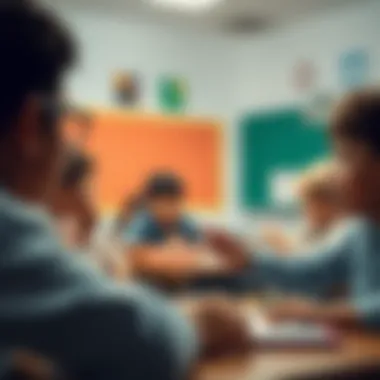Educational Institutions Around International City, Dubai


Intro
Education is a cornerstone of development, especially in a thriving metropolis like Dubai. Families seeking suitable educational institutions around International City often face a landscape marked by diversity, competition, and choices tailored to varying educational philosophies. This area, known for its multicultural environment, holds numerous opportunities for families looking to provide their children with quality education.
As International City expands, so does its appeal to families. Schools in the region offer different curricula, modern facilities, and a range of extracurricular activities. Understanding this ecosystem is crucial not only for parents but also for potential investors and stakeholders who recognize the rising demand for high-quality educational services.
In this exploration, we will discuss the types of schools available, delve into community feedback, and highlight important aspects for families considering their educational options. This comprehensive guide aims to enlighten readers about the schooling landscape in and around International City, ensuring informed decisions can be made regarding their children's futures.
Preamble to Schools in International City
When we chat about the living experience in International City, Dubai, the conversation often veers towards schools. The educational institutions found here play a significant role in shaping the community and cater to a diverse population. With families from various nationalities calling this area home, the range of schools reflects this multicultural environment, offering curricula from across the globe.
Understanding the educational landscape in International City is crucial for parents making decisions about their children's future. It's not just about finding a school; it's about choosing an institution that aligns with the family's values and aspirations. The proximity of these schools to residential areas adds convenience, making daily commutes easier for parents and students alike.
Three main elements stand out when discussing schools here:
- Diversity of Curricula: Parents can find options catering to different educational philosophies. Whether you prefer a British curriculum, an American approach, or perhaps an International Baccalaureate, there's something for everyone.
- Community Feedback: The perspectives from parents and students provide invaluable insights. Their experiences can highlight both strengths and areas for improvement within these institutions, helping prospective parents make informed choices.
- Facilities and Resources: Good schools are not just about the curriculum they teach; facilities matter too. Many institutions in International City boast modern amenities, sports facilities, and extracurricular opportunities that enhance the learning experience.
"Choosing the right school is like picking a second home for your child, and in a melting pot like International City, the options are as varied as the cultures represented here."
The Importance of Educational Choices
Selecting the right educational institution is a significant decision for parents and guardians, especially in a diverse area like International City, Dubai. This choice shapes not only the learning experience of children but also their social and emotional development. It impacts everything from academic performance to future career opportunities. A well-chosen school can provide a supportive environment that encourages growth, fosters independence, and instills a love for learning.
In recent years, there has been a notable shift in focus towards choosing the perfect school. Parents are eager to find institutions that align with their values, educational philosophies, and the specific needs of their children. Here are some key benefits of carefully considering educational options:
- Alignment with Values: Different schools propagate various educational approaches. Whether you favor traditional methods or more progressive and holistic philosophies, finding a school that resonates with your family’s values is crucial.
- Diverse Learning Environments: Schools offer various environments, from strict and academically rigorous to casual and creativity-driven. This means parents can choose what they think suits their child best—whether a structured setting or a more relaxed, creative atmosphere.
- Long-term Benefits: The right educational choice can impact a child's future academic and career pathways. Choosing a school that emphasizes not just core subjects but life skills can equip students with the tools they need to thrive in an ever-changing world.
An understanding of the local educational landscape is essential in making informed decisions.
Understanding the Educational Landscape
International City is home to a multitude of educational institutions that cater to a variety of curricula and teaching methodologies. This rich educational tapestry means that parents need to be well-informed about the options available to them. Each school brings its own branding and reputation, giving parents a plethora of choices. The competition among schools can enhance the quality of education as they adapt to student needs and parental expectations.
Some aspects to consider about the educational landscape include:
- Curricula Variety: From British to American and International Baccalaureate programs, there's a curriculum for every student preference. Each has distinct teaching styles that may appeal differently to various learning preferences.
- School Reputation: Past performance and the feedback from current or former students and their parents can offer insight into a school’s quality. Recommendations and reviews provide valuable perspectives that go beyond academic statistics.
- Facilities and Resources: Modern schools often boast state-of-the-art facilities. The availability of libraries, laboratories, and extracurricular resources can enrich the overall educational experience, making them important factors to weigh in the decision-making process.
Factors Influencing School Selection
Several factors can shape a parent's choice in selecting an educational institution. Here are important considerations that can influence this decision:
- Proximity to Home: Geographic location often plays a critical role; a nearby school can ease daily routines and reduce commute stress for families.
- Financial Considerations: Tuition fees can vary widely among schools. It's essential to factor in the overall cost of education, including uniforms, materials, and extracurricular fees.
- Extra-Curricular Opportunities: Parents might consider schools offering diverse extracurricular activities. These programs can engage students beyond academics and help in developing soft skills such as teamwork and leadership.
- School Culture: The social environment within a school is crucial. Parents should look for schools that foster an inclusive, respectful atmosphere where every student feels valued.
Curriculum Types Available
When considering educational institutions for children, parents must assess the curriculum types offered by schools. This aspect is pivotal as it shapes the students' overall learning experience and outcomes. Curriculum types vary not just in content but also in teaching methodologies, assessment strategies, and the overall philosophy of education. Understanding these differences can greatly influence a family's choice and help align educational goals with those available in nearby institutions, ensuring that children receive a well-rounded education tailored to their needs.
British Curriculum Schools
British Curriculum schools are popular among expatriates and locals alike. This system follows a structured approach, leading to internationally recognized qualifications like the IGCSE and A-Levels. Schools following the British model often emphasize critical thinking, creativity, and analytical skills, which prepare students for higher education and diverse career paths.
Key features include:
- A well-defined age-based progression
- Strong emphasis on core subjects like English, Mathematics, and Science
- Regular assessments to monitor student progress
- Extensive extracurricular options that encourage holistic development
Parent feedback often highlights the strong foundation it provides in preparing students for future academic challenges. Families typically value this curriculum for its focus on fostering independence and a thorough understanding of the subject matter.
American Curriculum Schools
American Curriculum schools are distinguished by their flexible and broad-based approach to education. These schools usually offer a liberal arts education, wherein students learn a wide array of subjects that include but are not limited to the humanities, sciences, and arts. The curriculum culminates in the attainment of a High School Diploma and prepares students for standardized college admissions tests like the SAT and ACT.


Distinctive features include:
- A focus on interactive and experiential learning
- Varied elective courses that allow for personalization of the education path
- Continuous assessment through projects, presentations, and regular testing
- Emphasis on both academic rigor and personal development
The flexibility in choosing subjects gives students an opportunity to tailor their education according to their strengths and interests, which is a significant appeal for many parents searching for schools in the area.
IB Curriculum Institutions
International Baccalaureate (IB) schools are known for their global perspective and rigorous academic standards. The IB program encourages students to think critically, engage with international issues, and develop a profound sense of community and responsibility. With a primary focus on the development of the learner, they emphasize inquiry-based learning and the importance of intercultural understanding.
Highlights of the IB curriculum include:
- A holistic approach to education encompassing academics, creativity, action, and service
- Comprehensive assessments and examinations that are recognized worldwide
- Emphasis on research and independent projects
- Development of a second language, fostering global citizenship
For parents keen on providing their child with an international experience and qualifications that open doors across the globe, IB institutions are often seen as the gold standard in education.
Other International Curriculum Options
Aside from the mainstream systems, there exist numerous other international curricula that cater to diverse family backgrounds. These can vary from systems inspired by national models like the French Baccalaureate to innovative Montessori and Waldorf methodologies that prioritize student-driven learning environments.
Parents might consider:
- French Curriculum Schools: Engaging students in a model that incorporates the French national education system.
- Montessori Schools: Fostering self-directed learning and encouraging exploration.
- Waldorf Schools: Focusing on artistic expression and natural world connections.
These alternative curricula often appeal to families seeking a unique, personalized education for their children. They enhance the learning environment by providing innovative teaching methods and often highlight community and environmental consciousness.
Choosing a curriculum is crucial, as it lays the foundation for children’s future education and career paths. It’s about finding the right fit for each child based on their individual needs, learning style, and family philosophy.
Notable Schools Near International City
When it comes to securing a bright future for children, selecting a suitable educational institution is paramount. The schools in the vicinity of International City offer diverse approaches to learning, which can cater to the varied needs of families. Each institution provides not only academic insights but also a community environment that nurtures young minds.
Moreover, the blend of different cultural backgrounds in Dubai, especially around International City, elevates the educational experience. Schools are more than just a place of learning—they also serve as community hubs, fostering friendships and cultural exchanges.
School A Overview
Facilities and Extracurricular Activities
School A boasts impressive facilities that include state-of-the-art laboratories, expansive libraries, and outdoor sports areas. These amenities are designed not just for routine academics but for enhancing students' overall experience. With an emphasis on extracurricular activities, children can pick from sports like basketball and soccer, or delve into arts and music, all of which contribute significantly to their development. The availability of such activities demonstrates the school's commitment to holistic education—an underpinning principle that aligns with modern educational philosophies.
A remarkable feature of School A is its commitment to sustainability, with eco-friendly practices woven into its extracurricular offerings, such as gardening clubs and recycling initiatives. This is more than a popular choice; it’s an innovative approach that teaches children the importance of environmental stewardship.
Parent and Student Reviews
The perspectives of parents and students often provide invaluable insights into the school environment. Feedback collected about School A highlights high satisfaction rates among parents regarding teacher-student ratios and individual attention to students. Many rave about the approachable nature of the faculty, which adds a comforting layer to the educational experience. Students, on the other hand, express a sense of belonging and enjoyment, critical for fostering an engaging learning atmosphere.
However, some reviews highlight concerns regarding the transition periods between grades, indicating a need for improved continuity. As these insights emerge, they provide future families contemplating School A with a comprehensive view, ensuring that they make an informed choice.
School B Overview
Academic Performance Metrics
When evaluating School B, its academic performance metrics stand out. Regular assessments and standardized testing practices reveal that students consistently achieve above average scores. Participation rates in advanced placement courses and extracurricular academic competitions also indicate a high level of engagement and ambition among students—factors that resonate with parents keen on ensuring their children are well-prepared for higher education.
The competitive atmosphere of the school pushes students towards excellence, a distinguishing factor that many families find attractive. However, there sometimes arises the debate on whether intense competition benefits all students equally, pointing to the necessity for schools to balance rigor with support.
Tuition Fees and Admission Process
A crucial consideration for families is the tuition fees and the admission process of School B. The fee structure is designed to remain competitive yet reflects the quality of education provided. Potential families should keep in mind, though, that additional costs for uniforms, textbooks, and extracurricular activities can add to the overall expense.
Furthermore, navigating the admission process can be complex. While the school offers a streamlined online application, some parents have mentioned a need for clearer communication during the process which can often feel overwhelming. This aspect calls for attention, reminding prospective families to prepare adequately to ensure a smooth transition.


School Overview
Unique Programs Offered
What sets School C apart is its diverse array of unique programs tailored to various interests—from robotics clubs to language immersion courses. Such initiatives not only enhance the academic curriculum but also prepare students for a globalized world. The integration of technology into everyday learning through programs that foster critical thinking skills is especially noteworthy.
These unique programs cater to niche interests and talents, which is a significant selling point for families looking for a school that embodies a forward-thinking philosophy. Nevertheless, it is essential for parents to evaluate how such programs align with their child's interests to ensure the best fit.
Community Involvement
Community involvement is a hallmark of School C, where students actively participate in outreach initiatives. Engagement with local charities and cultural events underlines a sense of social responsibility. Reviews from parents often commend the school’s efforts to instill values of community service in students, which builds character and empathy—traits that are invaluable in today's world.
That said, some parents express a desire for more structured opportunities for parents to engage with the school on projects, finding existing channels lacking or insufficiently communicated. The involvement of families in the educational journey is vital, so this feedback underscores an area for potential growth in School C’s community approach.
Facilities and Resources
When evaluating educational institutions near International City, Dubai, the significance of facilities and resources cannot be overstated. These elements play a fundamental role in shaping the quality of education that students receive. A school is not just a building where lessons occur; it's an environment that fosters learning, creativity, and personal growth. The presence of well-equipped facilities can enhance the educational experience, igniting students’ passions and enabling them to thrive.
Libraries and Learning Resources
Libraries serve as the heart of a school's learning resources. An extensive collection of books, journals, and digital media can greatly enhance students' research capabilities and reading habits. A well-curated library encourages independent learning and critical thinking, as students have access to a diverse range of materials. Many schools in the area are increasingly integrating their libraries with digital tools, allowing students to explore resources online and access e-books. This blends traditional learning with modern technology, making the library an engaging hub for students.
Additionally, schools that offer study rooms or quiet zones can support students who need focused study sessions or group discussions. Having access to these spaces encourages collaborative learning, which is an essential skill in today’s interconnected world. The key takeaway is that libraries and learning resources are not just supplementary; they are vital for nurturing informed and inquisitive minds.
Sports and Recreational Facilities
Physical education is as crucial as academic learning. Schools that prioritize sports and recreational facilities understand the importance of balancing mind and body. Having access to basketball courts, swimming pools, playing fields, and gyms encourages students to engage in physical activity, which is vital for their overall health and well-being.
Recreational facilities offer more than just opportunities for exercise. They cultivate teamwork, discipline, and leadership skills through organized sports. Moreover, schools that host annual sports days or inter-school tournaments help students build a sense of community and school spirit.
Investing in quality sports facilities can be a significant draw for families looking for holistic educational experiences for their children. After all, in a world so focused on academics, learning to work collaboratively in a sports setting is invaluable.
Technology in Education
In the digital age, technology integration in education is non-negotiable. Schools in and around International City increasingly recognize this and are equipping classrooms with smart boards, tablets, and other tech tools. These resources facilitate interactive learning, making lessons more engaging for students. For instance, using educational software can offer personalized learning experiences tailored to individual student needs.
Furthermore, access to technology fosters essential skills like digital literacy and critical thinking. Programs that teach coding or computer science principles can prepare students for the job market, which is more competitive than ever.
As schools adopt more innovative educational practices, it becomes increasingly important for parents to consider not only what is taught but also how it is delivered. These technologies not only streamline the learning process but also prepare students for a future in a rapidly evolving digital landscape.
"Investing in education facilities and resources is investing in a brighter future for our children."
When choosing a school, families must consider these facilities and how they align with their values and expectations. Schools that foster a rich environment filled with various resources not only elevate the learning experience but also empower students to become well-rounded individuals.
Community Insights
Understanding the community surrounding educational institutions is pivotal for parents and other stakeholders in making informed decisions about school selection. The fabric of a neighborhood can heavily influence the overall educational experience a child receives. In this section, we'll delve into two key facets of community insights: perspectives from parents and experiences of students. These insights serve as a compass for those navigating the educational landscape near International City, enabling them to gauge school quality not just through statistics, but through the lived experiences of a shared community.
Parent Perspectives
When it comes to selecting a school, parents often rely on real-world feedback from those who have already navigated the terrain. This feedback can range from opinions on academic rigor to insights on the social environment within the schools.
- Quality of Communication: Many parents emphasize the importance of clear and open communication from the school's administration. This contributes significantly to how comfortable they feel about their children’s education and safety. For example, a local school with a regular newsletter keeps parents informed about upcoming events and provides a platform for feedback.
- Support for Diverse Needs: Parents also find it crucial for schools to cater to diverse learning needs. A survey conducted in the International City area indicated a growing demand for schools that accommodate students with special educational needs or language barriers.
- Community Engagement: Schools actively engaging with their communities through events, workshops, and open houses help in building trust. One particular school organizes monthly parent-teacher meetings that foster collaboration and strengthen the school-family bond. Such interactions are a small but vital cog in turning a school into a welcoming community.
"As a parent, my priority is my child's well-being and development. Schools that understand this and involve us in the process truly stand out." - Local Parent
Student Experiences
Students offer a distinct perspective that can uncover the nuances of school life. Their experiences provide insights often overlooked by adults.
- Peer Interactions: Students often talk about friendships made through shared extracurricular activities. Schools that promote clubs or sports play an integral role in fostering these connections. In fact, many students affirm that the friendships they forge often translate into a supportive network that lasts beyond their schooling years.
- Academic Pressures: Another common theme is the pressure students face regarding academics. An analysis of interviews from students indicates that those at institutions with supportive mentorship programs feel more at ease. A local school’s initiative to start homework clubs has been praised for alleviating stress by providing additional academic support and a community space for collaboration.
- Cultural Exposure: Given the diverse population of the International City area, students often appreciate opportunities for cultural exchange within their schools. Many recount events held to celebrate different cultures, which not only enhance their worldly perspective but also promote inclusivity and respect.


Parents and students alike contribute to a well-rounded picture of educational experiences. Insights derived from their perspectives enrich the narratives of schools and assist prospective families in making astute educational choices. Engaging with the community allows for a deeper understanding of the nuances involved in schooling decisions, thus paving the way for a more fulfilling educational journey for students.
Transport and Accessibility
When considering educational institutions near International City, transportation and accessibility emerge as crucial factors. Parents deeply invest in their children’s education, and knowing how easily they can commute to schools directly impacts their choices. Smooth transport channels not only save time but also reduce daily stress for both students and their families. Let’s delve into the elements that make transportation and accessibility pivotal in this area.
Proximity to Major Roads
One of the strongest selling points for any school is its location, particularly concerning major roads. International City is strategically situated near several major thoroughfares. The proximity of educational institutions to these roads simplifies transportation routes for parents. Schools located close to highways such as Sheikh Mohammed Bin Zayed Road or Al Awir Road let families swiftly navigate their way during peak hours.
- Benefits of Accessibility:
- Time Efficiency: Minimizes the amount of time spent in transit, allowing children more time for studies or extracurricular activities.
- Safety Factors: Well-connected roads usually have better lighting and traffic management.
- Convenience for Parents: Easy drop-off and pick-up options help parents allot less time to travel during the busy workweek.
The architecture of roads in and around International City is another consideration. The design supports efficient traffic flow, making commuting less daunting. For families, this means that a school just a few kilometers away can feel much closer when it’s well-connected to vital roads.
Public Transport Options
Public transport is another facet that adds immense value to educational institutions nearby. For residents who may not own private vehicles, bus routes, metro access, and even taxi services play an instrumental role in shaping school choices. In particular, public buses running from Dubai’s central stations to various housing markets offer reliable options for families.
- Key Transportation Features:
- Accessibility of Bus Services: Many routes passing through International City connect to other parts of Dubai, ensuring students can commute without hassle.
- Metro Developments: The ongoing expansions in Dubai’s Metro system signal growing accessibility, making locations more attractive.
- Interconnected Transport Systems: Integrated platforms that combine multiple modes of transport allow families to plan their routes efficiently.
It’s worth mentioning that public transport is continuously evolving. With Dubai's dedication to becoming more sustainable and reducing the number of vehicles on roads, improvements in public transport directly contribute to the educational landscape in International City. Students are not only benefiting from access but are also encouraged to adopt greener commuting habits.
In summary, the ease of transportation greatly shapes educational choices in International City. Parents often prioritize schools based on these accessible logistics, ultimately influencing their decision-making.
Ensuring convenient access—whether through major roads or reliable public transport options—is fundamental for a balanced educational framework, making it a worthwhile investment for families in the region.
Future Trends in Education Near International City
The landscape of education is undergoing a significant transformation, especially in areas experiencing rapid growth like International City, Dubai. As families flock to this increasingly populated locale, the educational sector is adapting to meet the new demands. This section digs into what's shaping the future of education around International City.
Growing Demand for International Schools
The influx of expatriates and a diverse population directly contribute to the mounting demand for international schooling options. Parents are seeking schools that not only provide high-quality education but also reflect the multicultural environment that Dubai is renowned for. With a myriad of curriculums from various educational philosophies, schools are finding ways to attract families by emphasizing inclusivity and cultural understanding.
The key factors driving this demand include:
- Diverse Curriculum Offerings: As more parents look for tailored educational experiences for their children, schools are offering unique programs such as bilingual education and international curriculums. This aspect not only enhances learning but also prepares students for a globalized world.
- State-of-the-Art Facilities: New educational institutions are embracing modern technologies and innovative teaching methods. Parents often prefer schools equipped with advanced resources to ensure their children have access to engaging learning environments.
- Community Engagement: Schools that foster a strong relationship with the local community tend to be more appealing. Initiatives that promote parental involvement and community service resonate well with families looking for holistic educational experiences.
"The right education can open doors that last a lifetime, and International City’s schools aim to provide that for every child."
Impact of Population Growth on School Development
As the population of International City expands, the pressure on existing educational facilities grows. This demographic shift spurs both challenges and opportunities for educational institutions. More students require more schools, and the urgency for development becomes apparent. Institutions must strategize and enhance their capacities to serve the burgeoning population effectively.
Considerations regarding this impact include:
- Expansion Plans: Educational developers are identifying potential plots for new schools or annexes. Local authorities are also recognizing the necessity to facilitate permits and infrastructure upgrades to support these growth initiatives.
- Quality of Education: The rapid establishment of new schools often raises concerns about maintaining educational standards. Therefore, long-term planning and teacher training programs become pivotal to ensure that expanding facilities do not compromise quality.
- Innovative Solutions: Schools are exploring partnerships with tech firms to integrate distance learning options, which can cater to fluctuating enrollment numbers. Hybrid learning, combining in-person and online classes, is likely to gain traction as a viable solution.
The future of education near International City is nothing short of promising, marked by active engagement from all stakeholders involved. Drawing families in with top-notch options helps solidify this community’s commitment to fostering an enriching educational environment. As educational institutions respond to these growing demands and population changes, they are laying down a robust foundation for future generations.
Culmination
In summing up the educational offerings near International City, it becomes evident that choosing the right school is more than just a process; it is a significant decision that shapes a child's future. The importance of this topic cannot be overstated, especially given the rapid developments occurring in Dubai and the growing diversity of its population. Families considering relocation or settling in this area need ample information about the academic institutions available, and that’s a core benefit of this article.
When examining schools, several specific elements require careful consideration. Curriculum types, for instance, play an essential role in determining the educational path a child will follow. Whether opting for a British, American, or IB curriculum, each offers distinct methodologies and philosophies, which cater to varying learning styles and aspirations.
Moreover, facilities and resources are critical in assessing a school's adequacy. Parents seek environments that allow their children not only to learn but to thrive. Schools equipped with libraries, sports facilities, and technology resources can significantly enhance the learning experience. It’s not just about academic excellence; a well-rounded education includes extracurricular opportunities that foster growth beyond textbooks.
In addition, community insights, derived from parent and student experiences, provide a candid glimpse into the school's environment. Understanding parental perspectives, especially regarding their satisfaction with the educational approach and community involvement, can inform potential enrollees about the school's culture. One might quote a parent, "It takes a village to raise a child," emphasizing the importance of a supportive community.
Furthermore, families need to contemplate the accessibility of these institutions. Knowing their proximity to transport links can greatly influence a family's daily routine and consequently the well-being of children. In a city like Dubai, where traffic can be a significant concern, time and ease of travel to school should not be overlooked.
Ultimately, the growing demand for international schools in International City will continue to evolve. Population growth directly impacts the development of new educational facilities, which suggests that parents should keep an eye out for trends. Staying informed about future educational trends can place families in a stronger position when making the right choice for their children.



